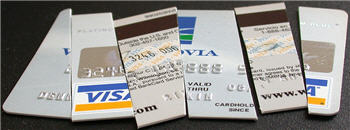Senate May Break "Price Fixing" On Credit Card Swipe Fees
As the Senate debates the financial reform bill, one amendment may be good news for small businesses — though it could offer a mixed bag to consumers. The amendment, floated by Sen. Richard Durbin (D-IL) would give small businesses more flexibility when it comes to working with companies like Visa and Mastercard that process credit card transactions. And it would give the government the ability to force processors to cut the rates they charge to manage debit card transactions to fees that are “reasonable and proportional to the actual cost incurred.”
The New York Times reports:
Last November, the Government Accountability Office, to the surprise of few, concluded that merchants are paying more in so-called interchange, or “swipe,” fees to credit card networks for processing transactions. In January, our colleague Andrew Martin charted the growth of swipe fees on debit card transactions, which have become a profit center for banks large and small. When customers sign for a debit card transaction, a merchant pays on average 75 cents for every $100 in purchases. A Visa official told Mr. Martin that the fees are “not a cost-based calculation, but a value-based calculation” — based, that is, on what the market will bear.
But Mr. Durbin, too, believes that the market is essentially a monopoly, and his amendment takes aim at what he calls “price-fixing” in two ways.
First, it would give the Federal Reserve the authority to force Visa and other credit card networks to set debit card transaction fees that are “reasonable and proportional to the actual cost incurred” when processing the transaction. “We’re trying to get debit cards treated simply as a check, so that the cost of processing that transaction is equivalent to, or at least held down near to, the cost of processing a check,” said Katherine Lugar, executive vice president for public affairs of the Retail Industry Leaders Association, which has led the lobbying effort supporting the amendment. “For a business to process a check, the cost is about five cents on a $100 transaction. For a debit card, it’s $2.15. And that varies by what category of retailer you are, and the type of transaction.”
The second part of the bill would allow merchants to “offer discounts to customers who use cards from other networks or other kinds of payments. They could also set minimum or maximum thresholds for any form payment, including credit or debit cards.” While this would help businesses manage the fees they pay for processing transactions, it could mean less flexibility for consumers who like to use their cards for small purchases.
Want more consumer news? Visit our parent organization, Consumer Reports, for the latest on scams, recalls, and other consumer issues.


